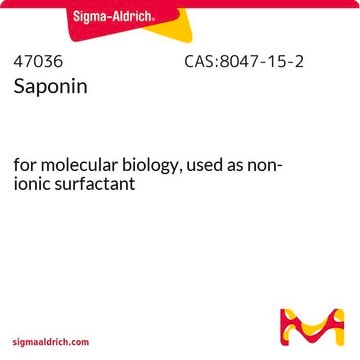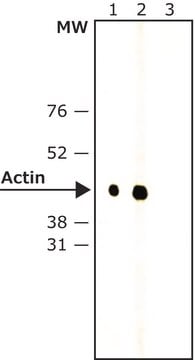S9896
Saporin Peptide
lyophilized powder, from Saponaria officinalis seeds
Synonym(s):
Saponin Extract
Sign Into View Organizational & Contract Pricing
All Photos(1)
About This Item
Recommended Products
product name
Saporin from Saponaria officinalis seeds, lyophilized powder
biological source
plant seeds (Saponaria officinalis)
Quality Level
Assay
10.00-30.00%
form
lyophilized powder
composition
Protein, ~20% Lowry
technique(s)
activity assay: suitable
storage temp.
2-8°C
General description
Saporin from Saponaria officinalis seeds has an N-terminal domain which is β-stranded and a C-terminal domain which is α-helical. It is made up of 253 amino acids and has a molecular weight of 28,621Da.
Application
Saporin from Saponaria officinalis seeds has been used to study its antifungal activity against Fusarium verticillioides.
Biochem/physiol Actions
Saporin from Saponaria officinalis seeds is a ribosome inactivating protein. It is used for the preparation of immunoconjugates. It has been shown to induce the formation of micronuclei in cultured human lymphocytes, thereby reducing cell viability and enhancing apoptosis.
Packaging
Package size based on protein content.
Physical form
Lyophilized powder containing glucose and sodium phosphate buffer salts
Storage Class Code
11 - Combustible Solids
WGK
WGK 3
Flash Point(F)
Not applicable
Flash Point(C)
Not applicable
Personal Protective Equipment
dust mask type N95 (US), Eyeshields, Gloves
Certificates of Analysis (COA)
Search for Certificates of Analysis (COA) by entering the products Lot/Batch Number. Lot and Batch Numbers can be found on a product’s label following the words ‘Lot’ or ‘Batch’.
Already Own This Product?
Find documentation for the products that you have recently purchased in the Document Library.
Elizabeth S Ingham et al.
The Journal of comparative neurology, 516(2), 125-140 (2009-07-04)
In mammals, non-image-forming visual functions, including circadian photoentrainment and the pupillary light reflex, are thought to be mediated by the combination of rods, cones, and the melanopsin-expressing intrinsically photosensitive retinal ganglion cells (ipRGCs). Although several genetic models have been developed
R Iglesias et al.
FEBS letters, 325(3), 291-294 (1993-07-05)
The type 1 ribosome-inactivating protein (RIP) saporin 5 isolated from seeds of Saponaria officinalis L. strongly inhibited translation carried out by Vicia sativa L. purified ribosomes. The toxin multidepurinated V. sativa rRNA, which upon treatment with acid aniline releases several
The crystal structure of saporin SO6 from Saponaria officinalis and its interaction with the ribosome.
Savino C
Febs Letters, 470(3), 239-243 (2000)
The amino acid sequence of a ribosome-inactivating protein from Saponaria officinalis seeds.
Maras B
Biochemistry International, 21(5), 831-838 (1990)
Analysis of the Sequence Preference of Saporin by Deep Sequencing.
Hauf, et al.
ACS chemical biology, 17, 2619-2630 (2023)
Our team of scientists has experience in all areas of research including Life Science, Material Science, Chemical Synthesis, Chromatography, Analytical and many others.
Contact Technical Service








